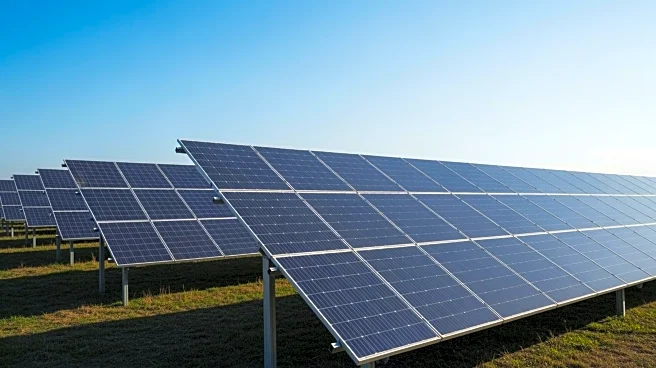What's Happening?
Rayzon Solar, a module manufacturer, has secured approval from the Securities and Exchange Board of India (SEBI) for its draft red herring prospectus (DRHP) to raise ₹15 billion (~$170.64 million) through an initial public offering (IPO). The company
plans to use up to ₹12.65 billion (~$147.5 million) of the proceeds to invest in its subsidiary, Rayzon Energy, and finance the development of a 3.5 GW TOPCon solar cell manufacturing plant in Surat, Gujarat. Axis Bank has approved a loan of ₹3 billion (~$34.11 million) for the facility, which is expected to be operational by FY 2027. The remaining funds will be used for general corporate purposes.
Why It's Important?
The approval for Rayzon Solar's IPO is a significant development in the clean energy sector, reflecting the growing interest and investment in renewable energy projects. The funds raised will support the expansion of solar cell manufacturing capabilities, contributing to India's renewable energy goals and reducing reliance on fossil fuels. This move aligns with global trends towards sustainable energy solutions and positions Rayzon Solar as a key player in the industry. The IPO also highlights the increasing role of capital markets in financing clean energy initiatives, providing opportunities for investors to support environmentally responsible projects.
What's Next?
Rayzon Solar's IPO is part of a broader trend of clean energy companies seeking capital market funding. As the company moves forward with its plans, it will focus on establishing the solar cell manufacturing plant and expanding its market presence. The success of the IPO could encourage other clean energy firms to pursue similar funding strategies, potentially leading to increased investment in renewable energy infrastructure. Stakeholders, including investors and policymakers, will be watching closely to assess the impact of these developments on the industry and the environment.
Beyond the Headlines
The IPO approval underscores the importance of regulatory support in advancing clean energy projects. It highlights the role of financial institutions in facilitating the transition to sustainable energy, as banks provide crucial funding for large-scale initiatives. The development of the solar cell manufacturing plant also raises questions about the environmental and social implications of expanding renewable energy infrastructure, including the potential for job creation and community impact.
















